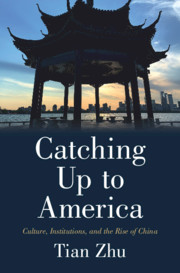Book contents
- Catching Up to America
- Catching Up to America
- Copyright page
- Dedication
- Contents
- Figures
- Tables
- Acknowledgments
- Abbreviations
- Introduction
- 1 Just How Rapid Is China’s Rise?
- 2 Explaining China’s Rise
- 3 Do Institutions Rule?
- 4 Savings and China’s Investment-Led Growth
- 5 The Role of Education
- 6 Technological Progress and Innovation
- 7 Confucian Culture as the Key Differentiating Factor
- 8 Why Is China Slowing Down?
- 9 Catching Up to America in a Post–COVID-19 World
- Appendix
- References
- Index
1 - Just How Rapid Is China’s Rise?
A Global Comparison
Published online by Cambridge University Press: 27 August 2021
- Catching Up to America
- Catching Up to America
- Copyright page
- Dedication
- Contents
- Figures
- Tables
- Acknowledgments
- Abbreviations
- Introduction
- 1 Just How Rapid Is China’s Rise?
- 2 Explaining China’s Rise
- 3 Do Institutions Rule?
- 4 Savings and China’s Investment-Led Growth
- 5 The Role of Education
- 6 Technological Progress and Innovation
- 7 Confucian Culture as the Key Differentiating Factor
- 8 Why Is China Slowing Down?
- 9 Catching Up to America in a Post–COVID-19 World
- Appendix
- References
- Index
Summary
Chapter 1 focuses on China’s fastest growing thirty-year period of 1982–2012, during which its per capita GDP grew by 9.12% per year. China grew not only faster than the United States (1.92%) and the high-income OECD countries (averaging 1.86%), but also much faster than low- and middle-income countries such as those in sub-Saharan Africa (averaging 0.45%) and Latin America and the Caribbean (averaging 1.21%). The chapter then evaluates the extent to which China’s growth rate may have been overstated. Two popular data sets, the Maddison Project and Penn World Table, adjust China’s growth downward by around 2 and 3 percentage points respectively. Even so, China’s growth was the still the fastest by far. The author also uses Engel’s Law and household income data to infer China’s true GDP per capita growth, which, averaging over thirty years, is more or less in line with the official figure. The chapter also shows that China’s rapid growth is similar to that achieved by Japan and the four Asian Tiger economies a few decades earlier. But no other developing countries have achieved the same success as these East Asian economies.
Keywords
Information
- Type
- Chapter
- Information
- Catching Up to AmericaCulture, Institutions, and the Rise of China, pp. 13 - 32Publisher: Cambridge University PressPrint publication year: 2021
